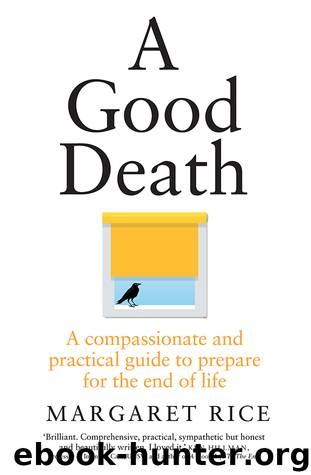A Good Death by Margaret Rice

Author:Margaret Rice
Language: eng
Format: epub
Publisher: Allen & Unwin
Published: 2019-04-02T04:00:00+00:00
Men and grief
People who are unable to express grief are more vulnerable to depression. This is especially true of men, who in our culture are expected to be stoic, to be strong and supportive, and it can be particularly painful when dealing with grief over a child. It’s the model of masculinity that Gus Worland, mentioned before, put under the microscope – and found to be flawed – in his television program Man Up.
He argued that the tough guy image – projected by men in many cultures – leaves our men vulnerable to holding on to grief without finding enough support. He concluded it’s okay for a man to cry, that it doesn’t mean his masculinity is threatened, that seeking support from others when a man is down – sometimes about the loss of a mate to suicide – is not a sign of weakness but of strength. However, ingrained ways of thinking and behaving can be slow to change.
Fathers can be overlooked when tragedy strikes their home. Men often experience and express their grief differently to women. This is despite the changes in our society that mean fathers are more involved in parenting and expected to show more emotion than before.
‘We spend our whole lives being told we need to be strong, look after our families, be successful breadwinners and providers,’ Tony explained at a men’s grief forum.
‘We learn this from our fathers and in our schools. Then in addition, our wives want us to be emotional, just at the right pitch, just at the level that they need at that particular time. Suddenly making that switch can be incredibly hard. It goes against what we’ve been taught and what we know. Women have years of experience at opening up for each other but for us it’s much more difficult,’ he said.
But sometimes the problem for a grieving father is not so much the way he sees himself but the way others see him.
In certain types of work (firefighting, policing, even medicine), men see their identity as protectors and people who will take charge in a dangerous situation. In their families they often take charge – sometimes even if it is only wielding the barbecue tongs – because this is what they feel they are expected to do. This mindset can lead to a brusqueness when confronting the death of someone they love, which can be misread as anger: frustration and grief can look like anger. And for a man to be angry in our culture today, with its rightful heightened sensitivities about domestic violence, is problematic.
In a poignant letter to The Lancet medical journal, a young mother, Rebecca Goss, whose sixteen-month-old daughter had died, wrote: ‘My husband and I have been treated kindly, by friends and strangers alike. But in the weeks and months after our daughter’s funeral, my husband was often asked “How is your wife coping?”’
But what about him?
And the wife is often treated as though she has lost someone she loved, whereas the man is
Download
This site does not store any files on its server. We only index and link to content provided by other sites. Please contact the content providers to delete copyright contents if any and email us, we'll remove relevant links or contents immediately.
| Grief & Bereavement | Hospice Care |
| Pet Loss | Suicide |
They Both Die at the End by Adam Silvera(9813)
Thirteen Reasons Why by Jay Asher(8901)
The Space Between by Michelle L. Teichman(6936)
Suicide Notes by Michael Thomas Ford(4824)
Tuesdays with Morrie by Mitch Albom(4779)
Suicide: A Study in Sociology by Emile Durkheim(3019)
The Checklist Manifesto by Atul Gawande(2849)
Tuesdays With Morrie by Mitch Albom(2759)
In the Woods by Tana French(2596)
Bossypants by Tina Fey(2525)
Robin by Dave Itzkoff(2438)
Olive Kitteridge by Elizabeth Strout(2370)
No Ashes in the Fire by Darnell L Moore(2332)
Reservoir 13 by Jon McGregor(2302)
End of Days by Sylvia Browne(2181)
All Things New by John Eldredge(2160)
Bus on Jaffa Road by Mike Kelly(2156)
Scar Tissue by Anthony Kiedis(2133)
No Time to Say Goodbye(2115)
